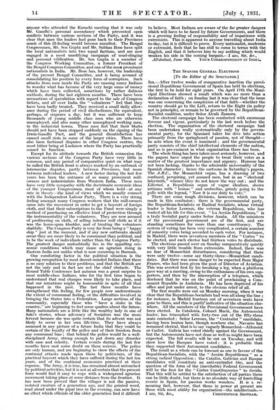THE SPANISH GENERAL ELECTIONS [To the Editor of the SPECTATOR.]
Sza,—After twelve weeks of comparative inaction the provi- sional Republican Government of Spain has held its elections,
the first to be held for eight years. On April 17th the Muni-
cipal Elections showed a result which was no more than a declaration of faith ; on Sunday last it was clear that the issue was one concerning the complexion of that faith—whether the country should go to the Left, return to the Right (in policy not in principle), or remain to be governed by the Republican. Socialist coalition, under Sefior Alcala Zamora.
The electoral campaign has been conducted with enormous fervour and vigour, particularly in the last week before the election. The organization of the electoral campaign had been undertaken really systematically only by the govern- mental party, for the Spaniard takes his dive into action primarily from the springboard of passion, not of thought— he acts when the event is imminent ; and the governmental party consists of the chief intellectual elements of the nation, and so is pre-eminent in what organization there has been.
The whole thing has been taken most seriously, however, and the papers have urged the people to treat their votes as a
matter of the greatest importance and urgency. Humour has not been lacking, thanks to the admirable universality of the Spanish character ; hence the cartoons in Saturday's papers. The A.B.C., the Monarchist organ, has a drawing of two confused, perspiring, yet amused men, lost in an electoral labyrinth,' whence they do not know the way out ; and the Libertad, a Republican organ of vague idealism, shows artizans with " boinas " and umbrellas, grimly going to the polls with the legend, "Now. it is our duty to vote."
There are some rough divisions, however, which can be made in this confusion: there is the governmental party, the Republican-Socialists or Radical Socialists, whose virtual leader is Sefior Lerroux, the veteran Republican, who has waited all his life for this event. "La Accien Republicans," is a truly Socialist party under Sefior Azaila. All the ministers of the provisional government are of the first, and are standing sometimes for more than one constituency. The system of voting has been very complicated, a certain number of minority votes being accorded to each voter. For instance, in Madrid, there were seventeen members of the " Cortes " to be elected, and each elector had thirteen votes to distribute.
The elections passed over on Sunday comparatively quietly with very little trouble from extremists. Indeed, there was no fear of Monarchist disturbances, considering that there were only twelve—some say thirty-three—Monarchist candi- dates. But there was some danger to be expected from Major Franco, who had been given the post of Director of Aviation. This was averted first by his breaking a leg, when a platform gave way at a meeting, owing to the enthusiasm of his own sup- porters, and then by the interception of a telegram, which disclosed that he was on the point of proclaiming a Com- munist Republic in Andalucia. He has been deprived of his office and put under arrest, to the obvious relief of all.
The first results were out on Monday morning, when it was clear that the Republican-Socialists had won all along the line ; for instance, in Madrid fourteen out of seventeen seats have gone to them, and this is par tly• indicative of the situation else- where. All the members of the Provisional Government have been elected. In Catalonia, Colonel Macia, the Autonomist leader, has triumphed with forty-two out of the fifty-three seats contested • Senor Lerroux, the " Centralist " candidate, having been beaten here, though nowhere else. Navarre has remained clerical, that is to say vaguely Monarchist—Alfonsist or Carlist. Galicia has voted chiefly against the Government, but the Autonomists have not done as well as might have been expected. The full results will be out on Tuesday, and will show how the Basques have voted : it is probable that they supported their Autonomist candidates.
The result as a whole can be forecast as one in favour of the Republican-Socialists, with the " Accidn Republicans" as a strong radical Opposition ; the Catalan, Galician and Basque candidates will constitute an anti-centralist bloc and the question of the form of the (inevitable) Federal Government will be the first for the " Cortes Constituyentes " to decide. That this will be settled to the satisfaction of all parties there can be little doubt, but there is no absolute way of foretelling events in Spain, for passion works wonders. It is a re- assuring fact, however, that those in power at present are those with most ability for organization—the intellectuals.—










































 Previous page
Previous page